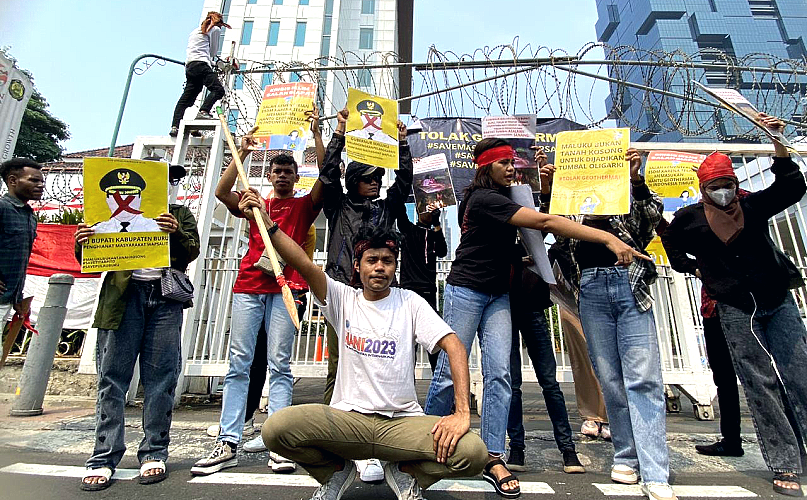
JAKARTA: Young people across Indonesia are standing up to fight for their futures amid anxiety about the climate crisis and the environmental destruction that will threaten their lives now and in the future, calling on all election candidates to join the struggle by addressing the problems thoroughly.
Thousands of young people from across Indonesia gathered in Jakarta on Nov. 25 to share their stories of fighting for their futures amid climate anxiety while calling on presidential candidates to address their concerns thoroughly.
The future of 17-year-old Ahmad Syaifullah is currently at stake as rising sea levels caused by climate change threaten to submerge his home in Pari Island, one of many small islands in Jakarta’s Thousand Island regency.
“Tidal flooding that has happened since 2020 has meant our land cannot be cultivated and water from wells is inaccessible,” Ahmad said during a youth conference organised by the Indonesian Forum for the Environment (Walhi), adding that Pari locals have to rely on distilled water for drinking.
While tidal flooding has erased at least 11 percent of land on Pari Island, the unpredictable weather in recent years has also made it difficult for 80 percent of villagers who made a living as fishermen to go to sea, he added.
For that reason, four residents of Pari Island filed a lawsuit in January against the world’s largest manufacturer of building materials Holcim at a Swiss court for its global operations that exacerbate climate change impacts.
While Pari Island is not directly affected by the industrial activities of Holcim, the company has produced over seven billion tonnes of carbon emissions between 1950 and 2022 globally that are believed to have caused sea levels to rise, according to Ahmad.
“The people of Pari Island have never contributed much to emissions but are the first to suffer the impact of climate change, while they [Holcim] do not,” he said.
In their legal complaints, the plaintiffs have demanded that Holcim reduce its carbon emissions by 43% in 2030 and 69% by 2040.
They have also asked the company to compensate them for the damage already caused by planting one million mangrove trees and building a dyke to protect Pari Island, as reported by kompas.id.
The lawsuit has been met by opposition from the company, saying that it would be unjust for the court to focus on a single company to address the complexity of climate action.
However, the Swiss cantonal court of Zug, where Holcim is based, granted the plaintiffs’ request for legal aid earlier this month, paving the way for the legal battle on Pari Island’s lawsuit against the construction materials company.
Although Ahmad is only a high school student and not one of the plaintiffs, he and many young people on the island have committed to planting mangroves every week to fight for their future.
Similarly, Christina Rumahlatu, 27, an indigenous woman from Maluku and student in Jakarta, is also fighting to protect her community’s customary land, which is threatened by mining activities. In 2022, Australian oil and gas company Balam Energy Ltd ransacked the indigenous land of the Bati tribe in Seram Island, Maluku, for exploration activities, Christina said.
“At the time, our indigenous people were extremely terrified of the company’s power. But the other students and I decided to return from Jakarta and help our parents to get the company out of there [the indigenous territory],” she said on the sidelines of the conference.
The effort to fight back was not easy, as Christina often questioned what the young people had while the company owned the money, power and weapons.
“The only thing we have is the spirit and legacy of our ancestors to fight for our customary land,” she said.
After extensive advocacy, her efforts with other young people, indigenous communities and civil society organisations managed to force Balam Energy Ltd to stop its operations and move off the Bati tribal land.
Christina is also currently fighting for indigenous land in Buru regency, which is threatened due to geothermal exploration by PT Ormat Geothermal Indonesia as part of the national strategic project (PSN) under the Energy and Mineral Resources Ministry.
She firmly rejects geothermal exploration that would destroy water sources for irrigating rice fields and threaten the extinction of eucalyptus oil as a source of livelihood for indigenous people.
“We [youth] have held demonstrations in front of the ministry office and had confrontations with the company. We also plan to sue the company directly [to stop its operations],” she told The Jakarta Post.
PT Ormat Geothermal Indonesia president director Dion Murdiono told the Post that the community’s concerns about water pollution, potential toxic gases and loss of the community’s source of income did not emerge until the exploration process was over.
“Since the beginning, we have obtained a permit from the environment ministry to open land in forest areas [for the exploration] and negotiated with the land owners,” Dion said on Dec 6.
“We have also carried out four dissemination sessions involving indigenous leaders, local communities, government, universities,” he added.
Some 1,300 young people across the country, including Ahmad and Christine, gathered to read “A Charter of Youth to Restore Indonesia” during the Nov 25 conference, which was formulated out of youth concerns about many issues, including climate change, education and employment.
“Today, young people are weighed down with the responsibility of 2045 Golden Indonesia. But [our] leaders have instead pushed us into an ecological disaster and climate crisis,” said one of the representatives while reading the charter.
Recognising the importance of the youth voice in determining the country’s development, they have committed to bringing their concerns and ideas within the charter to the prospective leaders elected next year.
Young people aged between 17 and 39 are expected to make up the majority of voters in the 2024 general election, according to data from the General Elections Commission (KPU).
Among the many issues youth fights for, climate change is at the forefront.
ADVERTISEMENT
ADVERTISEMENT








































